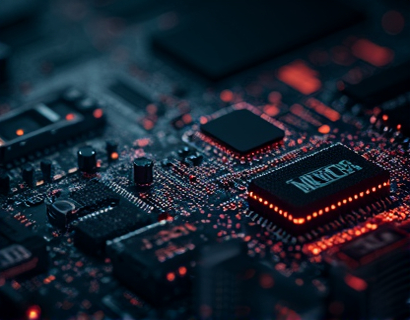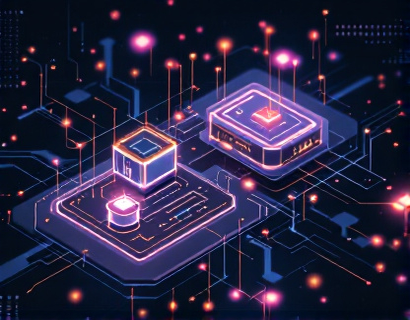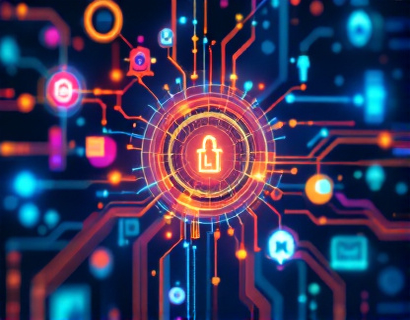Maximizing Digital Productivity and Engagement with Crypto and AI
The integration of cryptocurrency and artificial intelligence (AI) is revolutionizing the digital landscape, offering unprecedented opportunities for enhancing productivity and engagement. This article delves into the latest tools and applications that leverage these advanced technologies, providing a comprehensive guide for tech professionals and enthusiasts. By understanding and utilizing these innovations, users can significantly boost their efficiency and stay ahead in the rapidly evolving digital world.
The fusion of cryptocurrency and AI creates a powerful synergy that enhances various aspects of digital interactions. Cryptocurrency, with its decentralized and secure nature, provides a robust foundation for transactions and data management. AI, on the other hand, brings intelligent automation and predictive analytics to the table. Together, they form a dynamic duo that can transform how we work, communicate, and manage digital assets.
Enhancing Transaction Security and Efficiency
One of the primary benefits of combining cryptocurrency and AI is the significant improvement in transaction security and efficiency. Traditional financial systems often suffer from slow processing times and high transaction fees. In contrast, blockchain technology, the backbone of cryptocurrency, ensures fast and secure transactions with minimal costs. AI algorithms can further optimize this process by detecting and preventing fraudulent activities in real-time.
For instance, machine learning models can analyze transaction patterns and identify anomalies that may indicate fraud. These models can be trained on vast datasets to recognize suspicious behavior and automatically flag potential threats. This not only enhances security but also reduces the need for manual oversight, thereby increasing efficiency. Businesses and individuals can thus enjoy seamless and secure transactions without the hassle of traditional intermediaries.
Smart Contracts and Automated Processes
Smart contracts, self-executing contracts with the terms directly written into code, are another area where cryptocurrency and AI converge to maximize productivity. These contracts automatically enforce and execute agreements when predefined conditions are met, eliminating the need for intermediaries and reducing the risk of disputes. AI can further enhance smart contracts by providing intelligent negotiation and decision-making capabilities.
For example, AI-driven algorithms can analyze market conditions and dynamically adjust contract terms to optimize outcomes. This level of automation and intelligence can streamline complex processes such as supply chain management, real estate transactions, and legal agreements. By reducing manual intervention and ensuring compliance, businesses can operate more efficiently and with greater accuracy.
Personalized User Experiences
AI-powered personalization is a game-changer in the digital realm, and when combined with cryptocurrency, it can create highly engaging and tailored user experiences. Cryptocurrency platforms can use AI to analyze user behavior and preferences, offering personalized recommendations and services. This not only enhances user engagement but also increases the overall value of the platform.
For instance, a cryptocurrency exchange can use AI to analyze a user's trading history and preferences to suggest optimal trading strategies or highlight relevant market trends. By integrating blockchain, these recommendations can be securely and transparently delivered, ensuring that users have control over their data and transactions. This level of personalization can significantly improve user satisfaction and retention.
Decentralized Applications (DApps)
Decentralized applications (DApps) are a prime example of how cryptocurrency and AI can collaborate to create innovative digital solutions. DApps run on blockchain networks, leveraging the decentralized nature of cryptocurrency to provide transparent, secure, and censorship-resistant services. AI can enhance DApps by adding intelligent features such as predictive analytics, natural language processing, and automated decision-making.
For example, a decentralized finance (DeFi) platform can use AI to offer automated investment advice, risk assessment, and portfolio management. Users can benefit from data-driven insights and optimized strategies, all while maintaining control over their assets. The combination of blockchain and AI ensures that these services are both secure and highly efficient, making DApps an attractive option for tech-savvy users.
Enhancing Content Creation and Distribution
The content creation and distribution landscape is also being transformed by the integration of cryptocurrency and AI. Creators can leverage blockchain to monetize their content more effectively, while AI can help in generating, curating, and distributing content to the right audience. This synergy can lead to more engaging and relevant content, benefiting both creators and consumers.
For instance, AI-powered tools can analyze audience preferences and generate tailored content recommendations, ensuring that users receive content that resonates with them. Blockchain can ensure that creators are fairly compensated for their work, with transparent and traceable transactions. Smart contracts can automate royalty payments, ensuring that creators receive their due without the need for intermediaries. This not only enhances the creator ecosystem but also provides a more rewarding experience for users.
Improving Data Management and Analytics
Data management and analytics are critical components of modern digital operations, and the combination of cryptocurrency and AI offers significant advantages in this area. Blockchain provides a secure and immutable ledger for storing and managing data, while AI can process and analyze large datasets to extract valuable insights. This dual approach ensures data integrity and enhances the accuracy of analytics.
For example, a business can use blockchain to securely store customer data and transaction records, ensuring compliance with data protection regulations. AI algorithms can then analyze this data to identify trends, predict customer behavior, and optimize marketing strategies. The transparency and security provided by blockchain, combined with the analytical power of AI, can lead to more informed decision-making and improved business outcomes.
Challenges and Considerations
While the integration of cryptocurrency and AI offers numerous benefits, it is essential to acknowledge the challenges and considerations involved. One of the primary challenges is the regulatory landscape, which is still evolving in many regions. Businesses and individuals must stay informed about local and international regulations to ensure compliance. Additionally, the technical complexity of these technologies can be a barrier for some users, requiring education and support to fully leverage their potential.
Another consideration is the environmental impact of blockchain, particularly proof-of-work (PoW) systems, which consume significant energy. Transitioning to more sustainable consensus mechanisms, such as proof-of-stake (PoS), can help mitigate this issue. Furthermore, ensuring the privacy and security of user data remains paramount, as the combination of blockchain and AI can potentially expose sensitive information if not properly managed.
Future Prospects
The future of cryptocurrency and AI is promising, with ongoing advancements poised to unlock even more innovative applications. As technology continues to evolve, we can expect to see more seamless integration and enhanced functionalities. The development of interoperable blockchain networks, for instance, will enable different platforms to work together more effectively, creating a more connected and efficient digital ecosystem.
Moreover, the rise of quantum computing presents both opportunities and challenges. While quantum computers have the potential to revolutionize AI by solving complex problems faster, they also pose a threat to current cryptographic systems. The development of quantum-resistant algorithms will be crucial to ensuring the long-term security of blockchain-based solutions.
In conclusion, the fusion of cryptocurrency and AI is transforming the digital landscape, offering powerful tools and applications that enhance productivity and engagement. By embracing these technologies, tech professionals and enthusiasts can stay at the forefront of innovation, unlocking new possibilities and driving progress in the digital world.










































